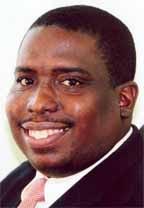-Bar Association
President of the Guyana Bar Association Teni Housty says the actions of Magistrate Yohannseh Cave in the David Leander trial reflect the legal system at work, while adding that the judiciary must continue to act fearlessly.
The discussions surrounding the decision of the Magistrate to determine admissibility of the confession statement “ought to be part of the judicial process,” Housty said last week, noting that the controversy surrounding the case has impacted on the independence of the judiciary. He explained that there are legal avenues through which the issue should be addressed.

Housty firmly defended judicial independence as judges being free to decide cases fairly and impartially, relying only on the facts and the law and he gave the opinion of the association as being in full agreement with the steps taken by Magistrate Cave during the Preliminary Inquiry of Leander, also known as “Biscuit.”
Housty noted that if a party is dissatisfied with the manner of a decision there are legal procedures in place to challenge it. He cited the “resort to the newspaper” where the issue of Magistrate’s Cave decision was debated as being outside of the legal avenues available. “The judiciary must continue to act fearlessly, irrespective of the criticisms and the duty of the judiciary is to act independent[ly] and based on the law. The Bar will continue to support a fearless, independent judiciary,” Housty stated.
Still on the issue of the availability of legal procedures, Housty said, that the case involving the magistrate triggers concern within the bar community because “when persons step out of the judicial process and challenge a decision,” it raises the fundamental issue of perception of independence in the judiciary. Housty said too that political parties and the public must be careful since their comments can have an adverse effect on the independence of the judiciary. He also urged magistrates and judges not to be influenced by any such comments made.
The debate about Magistrate Cave’s action stemmed from a public criticism by the ruling party, the PPP, of his decision to throw out Leander’s confession statement during the Preliminary Inquiry. The court was not fully satisfied that the oral statement allegedly made by Leander was taken under circumstances that were “free and voluntary.”
The People’s Progressive Party (PPP) argued in a press statement that it had been advised by legal experts that “the issue of admissibility of evidence is to be determined at the trial and not at the preliminary inquiry.” At a committal proceeding, the PPP said, a confession of the accused will be tendered into evidence “since its actual admissibility on the basis of voluntariness can only be determined at a voir dire hearing in the trial at the High Court.”
But in a letter to this newspaper former Chief Magistrate KA Juman-Yassin rejected the PPP claims of what constitutes the legal procedure here and referred to its declaration that confession statements are accepted in evidence at preliminary inquires and that only at a voir dire in the High Court is the matter of voluntariness determined as “completely erroneous.”
He argued that the preliminary inquiry is in reality a trial and all the rules of evidence apply, noting that no hearsay evidence should be admitted in evidence and “any exhibit which is sought to be tendered must satisfy the rules of admissibility.”
PPP/C Member of Parliament Anil Nandlall challenged Juman-Yassin’s opinion and argued that legal authorities support the PPP contention that the admissibility of confession statements should be decided by a voir dire in the High Court and not by a magistrate in a preliminary inquiry. Nandlall cited several authorities which he said governs the practice here and establishes the procedures as it relates to the issue.
Former Attorney General Bernard De Santos and attorney, Nigel Hughes later went on record as endorsing Yassin’s legal opinion. In addition, retired High Court judge Justice Winston Moore also weighed in on the issue saying that a magistrate has the power to apply common law rules of evidence and therefore has the power to determine the admissibility of a confession statement.





